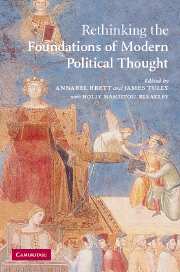Book contents
- Frontmatter
- Contents
- List of contributors
- Preface
- Part I Introduction
- Part II Rethinking the foundations
- 3 Foundations and moments
- 4 Skinner, pre-humanist rhetorical culture and Machiavelli
- 5 Unoriginal authors: how to do things with texts in the Renaissance
- 6 ‘The Best State of the Commonwealth’: Thomas More and Quentin Skinner
- 7 Scholasticism in Quentin Skinner's Foundations
- 8 Scholastic political thought and the modern concept of the state
- 9 ‘So meerly humane’: theories of resistance in early-modern Europe
- 10 Hobbes and democracy
- 11 A lion in the house: Hobbes and democracy
- 12 Hobbes and the foundations of modern international thought
- 13 Surveying The Foundations: a retrospect and reassessment
- Bibliography
- Index
3 - Foundations and moments
Published online by Cambridge University Press: 19 February 2010
- Frontmatter
- Contents
- List of contributors
- Preface
- Part I Introduction
- Part II Rethinking the foundations
- 3 Foundations and moments
- 4 Skinner, pre-humanist rhetorical culture and Machiavelli
- 5 Unoriginal authors: how to do things with texts in the Renaissance
- 6 ‘The Best State of the Commonwealth’: Thomas More and Quentin Skinner
- 7 Scholasticism in Quentin Skinner's Foundations
- 8 Scholastic political thought and the modern concept of the state
- 9 ‘So meerly humane’: theories of resistance in early-modern Europe
- 10 Hobbes and democracy
- 11 A lion in the house: Hobbes and democracy
- 12 Hobbes and the foundations of modern international thought
- 13 Surveying The Foundations: a retrospect and reassessment
- Bibliography
- Index
Summary
Context is king; but the present writer, to his embarrassment, cannot consider The Foundations of Modern Political Thought apart from a context formed by his own historical memory, in which he plays a large and autobiographical part. I shall elaborate on these memories, in the hope of offering a commentary on Quentin Skinner's work shaped by that work's relations with my own.
I can claim to have been present at the creation, not of Foundations alone but of the enterprise of which Skinner has become the leader. I date its birth about 1949, when Peter Laslett's edition of Filmer's Patriarcha pioneered the enterprise of finding out exactly when, and for what, a work of political theory was (a) written, (b) published, (c) answered. Laslett separated by nearly half a century the moment when Patriarcha was written (the 1630s) from the moment when it was published; he radically separated intention from effect, and focused attention on what was intended, and what actually happened, when Filmer'sworks were republished, by agents we are still thinking about, in 1679–80. What Laslett then did had two sets of consequences. In his own work it led to the revolutionary discovery that Locke's Treatises of Government were written about 1680, with intentions and therefore meanings necessarily unlike those he had when he published them in 1689.
- Type
- Chapter
- Information
- Rethinking The Foundations of Modern Political Thought , pp. 37 - 49Publisher: Cambridge University PressPrint publication year: 2006
- 10
- Cited by



